US Says Iran Must Address Its Concerns For Non-Nuclear Sanctions Relief

The United States said Thursday if Iran wanted sanctions relief beyond that of the 2015 Iran nuclear deal it must address US concerns beyond the pact.

The United States said Thursday if Iran wanted sanctions relief beyond that of the 2015 Iran nuclear deal it must address US concerns beyond the pact.
"We are not negotiating in public, but if Iran wants sanctions lifting that goes beyond the JCPOA, they will need to address concerns of ours beyond the JCPOA," a State Department spokesperson said, referring to the 2015 deal.
Iran has demanded that its Revolutionary Guard (IRGC) be removed from the US list of terrorist organization.
"Conversely, if they do not want to use these talks to resolve other bilateral issues beyond the JCPOA, then we are confident that we can very quickly reach an understanding on the JCPOA and begin reimplementing the deal," the spokesperson added. "Iran needs to make a decision."
The US spokesperson was responding to a top Iranian official who earlier said Iran will not give up on its plans to avenge the 2020 US assassination of Qods Force Commander Qasem Soleimani, despite "regular offers" from Washington to lift sanctions and provide other concessions in return.
The (Qods) Quds Force is the foreign espionage and paramilitary arm of IRGC that controls its allied militia abroad. The Trump administration put the IRGC on the State Department list of Foreign Terrorist Organizations in 2019.
"Under any return to the JCPOA, the United States would retain and aggressively use our powerful tools to address Iran’s destabilizing activities and its support for terrorism and terrorist proxies, and especially to counter the IRGC," the State Department spokesperson said.
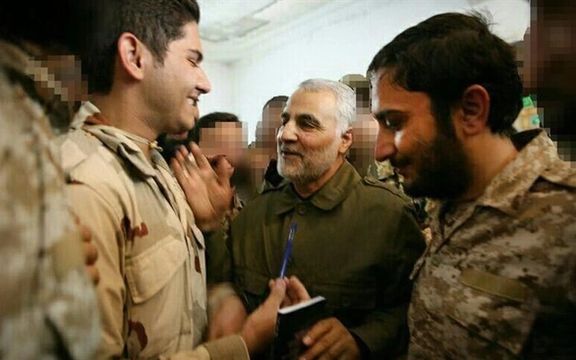
A senior Iranian military commander has insisted Tehran will not for the sake of renewing the 2015 nuclear deal drop the case of revenge for Qasem Soleimani.
Soleimani, commander of the Revolutionary Guards (IRGC) extra-territorial Quds Force, was killed in Baghdad along with nine others in 2020 by a drone strike ordered by President Donald Trump.
"They constantly send messages saying they will offer rewards and remove certain sanctions if we give up seeking revenge for Soleimani," Admiral Alireza Tangsiri, commander of IRGC naval forces, said Wednesday. "But this is wishful thinking. The Supreme Leader [Ali Khamenei] stresses taking revenge, and the IRGC commander has said that revenge is inevitable. We will, however, decide the time and place for it.”
With Iran’s talks with world powers over renewing the 2015 nuclear deal on hold, the strike on Soleimani has become tangled up in arguments over Trump’s 2019 listing of the IRGC as a ‘foreign terrorist organization’ (FTO).
US state department spokesman Ned Price said Monday the US was not prepared to remove the IRGC from its list as a condition for renewing the 2015 deal, the JCPOA (Joint Comprehensive Plan of Action) as it was "outside the purview" of the 2015 agreement. Price argued that if the US were to delist the IRGC then Iran should be prepared to negotiate other issues which are important for Washington, presumably Iran's aggressive regional policies and support for militant groups, which are also outside the JCPOA purview.

The pause in Vienna talks between Iran and world powers to revive the JCPOA has given opportunity for opponents of the agreement in both Washington and Tehran to express dissent, including within the US Democrat Party.
Iran is reportedly insisting on removing the IRGC from the FTO list, which is the only example of a sovereign state’s armed forces to be included. But in a letter to President Biden dated April 14, 900 ‘Gold Star’ families urged Biden not to lift the designation, which they said would widen the IRGC's access to resources and "fuel increased terror activities.”
A Gold Star Family is the immediate family member(s) of a fallen US service member who died while serving in a time of conflict.
Risky decision
In a statement released Thursday 40 former government officials and leading non-proliferation experts said that not restoring the JCPOA would “increase the danger that Iran would become a threshold nuclear-weapon state.” While not addressing the FTO listing, the statement noted that “some in Congress are threatening to block…steps necessary to bring Iran back under the nuclear limits set by the JCPOA.”
Some in Iran have blamed Biden for the impasse in the nuclear talks for being "weak" in the face of domestic opposition and failing to risk a political decision over delisting the IRGC.
The Qods Force − which takes its name from al-Quds, the Arabic name for Jerusalem − under Soleimani became deeply involved in the conflicts in Syria and Iraq. Trump claimed that the general, who was Iran’s main operative in the Middle East was killed because he was planning attacks on US troops but never offered evidence.
Days before Soleimani’s killing, Iraqi Shiite militia supported by Iran attacked the US embassy in Baghdad after repeated rocket attacks on US targets in 2019.
On April 8 the State Department said Bidenconsidered the Qods Force a ‘terrorist’ group, which some pundits took as a suggestion that the US might keep the Qods Force on the FTO list while removing the IRGC. With or without the FTO designation, the IRGC is subject to a range of US sanctions.
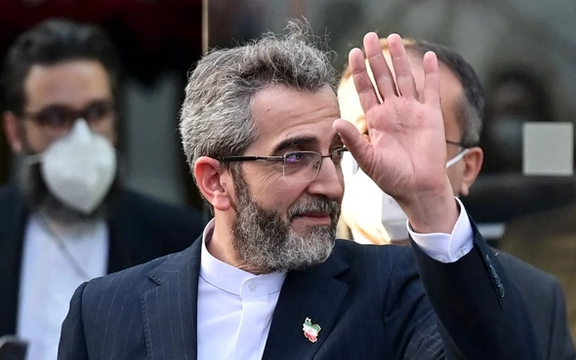
If the former Iranian government had concluded a nuclear agreement with the United States in 2021, Iran would have been ahead of the game, some argue in Tehran.
So called ‘reformist’ and moderate-conservative media and figures are saying that Iran’s nuclear negotiators last year had clinched a deal to restore the 2015 nuclear agreement known as the JCPOA in talks with world power from April to June, when presidential elections brought hardliner Ebrahim Raisi to power.
Almost simultaneously Tehran stopped the talks saying it needed time for its new government to form and resume negotiations, but that delay lasted five months, while American sanctions continued to wreak havoc on the country’s economy.
Former president Hassan Rouhani’s minister of cultural, and a well-connected moderate conservative former diplomat, Ali Jannati, told Khabar Online website on Thursday that the previous negotiating team had a pledge from the Biden Administration to lift all sanctions if the talks had reached fruition.
Jannati was implicitly referring to the current deadlock in the talks over Iran’s demand to remove the Revolutionary Guard (IRGC) from the United States’ list of Foreign Terrorist Organizations (FTO).
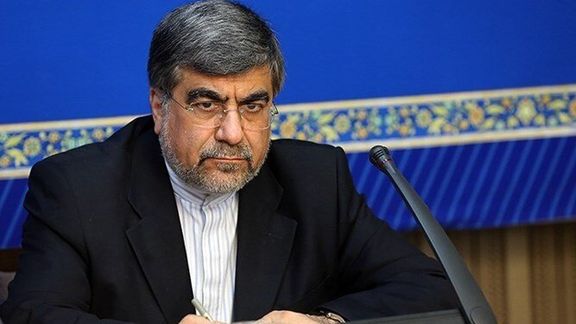
He accused Iran’s hardliners of not allowing the previous negotiating team to continue its work because of factional politics and this delayed an agreement for months – or perhaps indefinitely.
Jannati said that the United States was ready to lift all nuclear-related sanctions and moreover reverse former president Donald Trump’s Executive Order sanctioning Supreme Leader Ali Khamenei’s office and all related entities.
“Regarding removing the terrorist designation of the Guards, they [Americans] said it would depend on the progress in the talks and, for example, the release of American prisoners,” Jannati told Khabar Online. “But suddenly the talks were stopped, which I believe was [domestic] political move,” he added.
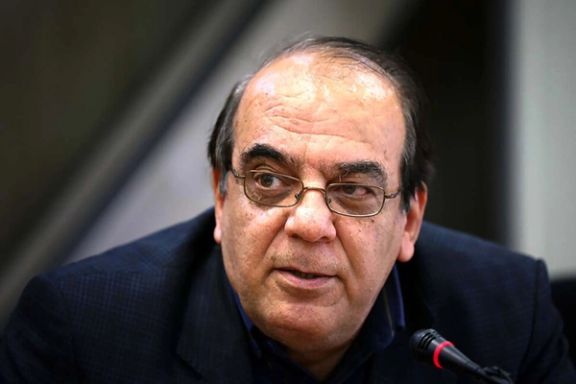
‘Reformist’ Etemad newspaper also on Thursday published an analysis of the nuclear issue and its impact on the economy, asking why the negotiations were stopped last year because of domestic political considerations.
“In six rounds of talks [in 2021] it was announced that an agreement was at hand, but…nothing was finalized to allow the new [Raisi] government to conclude a deal and claim credit. But this delay was damaging to the economy,” Etemad said.
The newspaper added that Iran could have sold billions of dollars of oil to Europe in the past nine months and regained other traditional clients, such as South Korea and Japan. In addition, in incalculable amount in foreign investments were lost.
At this juncture, Etemad said, a new hurdle has emerged, with Washington refusing to remove the IRGC from its list of terrorist organizations, unless Tehran agrees to negotiate over regional issues.
“Reformist’ politician and commentator Abbas Abdi told the newspaper that even if an agreement is reached it would give Iran fewer benefits than the original deal in 2015. A lot of uncertainty has crept in regarding the future and many foreign governments and companies would hesitate to expand ties with Iran not knowing when the new deal would fall apart.
“JCPOA’s main benefit [for Iran] was normalization of its economic ties [with the world] and oil exports…were just a part of that,” Abdi said, while if an agreement is reached now, it would mainly mean selling crude and receiving the money unhindered. The larger benefit of becoming part of the international economy has been lost, he argued.
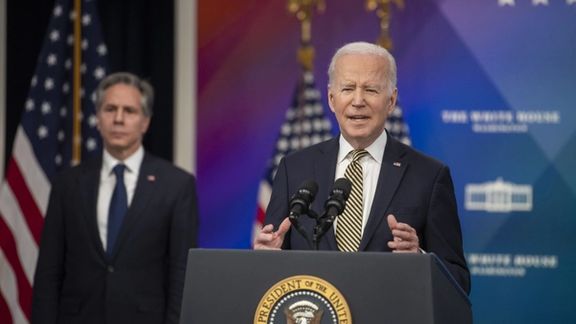
Iran's hardliners say the impasse in nuclear talks results from President Joe Biden's “weakness”, not its demand for delisting the Revolutionary Guards (IRGC).
Recent commentaries in hardline media reflect growing concerns among hardliners that Iranians would blame the IRGC for the failure to secure a deal to restore the 2015 nuclear agreement, and the lifting of sanctions, which increasingly impose hardships on ordinary people.
An unattributed commentary Wednesday in Tasnim news agency which is linked to the IRGC clearly indicated that Iran wants the IRGC to be removed from the US list of Foreign Terrorist Organizations (FTO) but claimed that this was the only "one of the remaining issues" on which the US side had to make a final decision.
The commentary accused the US negotiators of trying to exaggerate the importance of delisting of the IRGC to divert Iranian public opinion from the "real matter of contention".
"Limiting the causes of the halt in the talks to the removal of the IRGC from the FTO is the US negotiating team's psychological operation to put pressure on decision-making entities in our country," Tasnim wrote. The real issue, it said, is "Iran benefiting economically from a deal" if sanctions on "effectual individuals, entities, and companies in [Washington's] red list" are lifted.
The IRGC was designated under Donald Trump in April 2019. This was the first time that the US put another country's military on its terror list.
The government mouthpiece, Iran newspaper, also ran a commentary Wednesday in which it argued, indirectly, that the IRGC was not to blame for the continuation of sanctions that many Iranians see as a major contributor to their economic hardships.
"The main issue [preventing a deal] is the US administration's lack of confidence in making important decisions", the commentary entitled "Biden's Weak Administration the Main Cause of Not Reaching an Agreement in Vienna" said, conspicuously failing to mention the IRGC's name even once.
Instead, the writer of the commentary, Mehdi Poursafa, who often contributes to IRGC-linked media outlets such as Javan newspaper and Fars news agency, accused the Biden administration of lacking courage to bypass the opposition from the "Zionist regime and the Israeli-Arab lobby in Washington" despite having "the required political capacity to approve an agreement with Iran".
Poursafa opined that the Biden administration would not make a deal before the November Congressional elections. "But Iran can't remain indifferent to this matter. Tehran surely does not want to pay the price for the domestic problems of the Biden administration and will make its next move based on the US administration's behavior and commensurate to its own national interests," he said.
The Biden administration has come under pressure not only from Republicans, but also from some key Democrats who insist that the IRGC should remain of the FTO list. So far 49 Republican Senators have called on Biden not to make concessions to Iran.
Democratic Senator Joe Manchin who was one of the four Democrats to vote against the Iran nuclear deal under Barack Obama in 2015 in a letter to the Secretary of State Antony Blinken Tuesday said he supported Biden's 'diplomacy' with Iran but warned that sanctions should remain in place until Iran demonstrates "verifiable efforts towards curbing their malign influence".
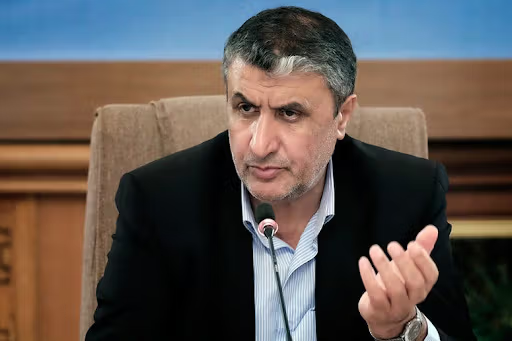
Iran’s nuclear chief says technical issues in the Vienna talks have been finalized and the remaining issues are political and related to the foreign ministry.
Head of the Atomic Energy Organization of Iran (AEOI) Mohammad Eslami said on Wednesday that the International Atomic Energy Agency (IAEA) raised some concerns about the country’s nuclear program in reports published during the past four years, but all such issues are resolved now.
He claimed that those reports were mostly based on allegations by Israel and some opposition groups against the Islamic Republic.
Eslami said that Iran and the IAEA handled their relations in accordance with Safeguard Agreement regulations and will continue their routine interactions.
Earlier in April, Eslami said Iran had sent documents related to outstanding issues to the UN nuclear watchdog.
He added that the nuclear sites and centers that were damaged in recent years, including Arak heavy water reactor, have been overhauled and are now operating as usual in accordance with the Strategic Action Plan for the Lifting of Sanctions, which was passed by the parliament in late 2020.
Eslami’s claims have not been independently verified. The IAEA also has not confirmed that outstanding issues with Iran have been resolved.
Eleven months of indirect talks between Iran and the United States to restore its 2015 nuclear agreement, (JCPOA), have stalled as Iran has demanded the removal the Revolutionary Guard (IRGC) from the US list of Foreign Terrorist Organizations.
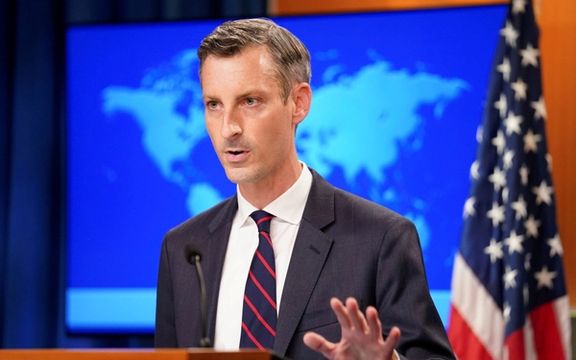
Washington signaled on Monday that it is not willing to remove terrorism-related sanctions demanded by Iran as a pre-condition to reach a new nuclear deal.
At his press briefing Monday, the US State Department Spokesman Ned Price reiterated that the administration of President Joe Biden did not want to "negotiate in public" but also said that Tehran needs to address the concerns of Washington if it wants sanctions-lifting that goes beyond the 2015 nuclear deal, the Joint Comprehensive Plan of Action (JCPOA).
"If they want to negotiate issues that fall outside the purview of the JCPOA, then we’ll do that, but they will need to negotiate those issues in good faith with reciprocity," Price said.
Apparently the two most important demands, unrelated to the JCPOA, that Iran has put on the table, and wants to be met as "signs of goodwill" before a deal is signed, are removing the Revolutionary Guard (IRGC) from a US terror list and the release of Iranian funds frozen under US sanctions in other countries, such as South Korea and Iraq.
The IRGC, however, was sanctioned in 2019 by the Trump administration as a Foreign Terrorist Organization, and Washington has signaled that if Tehran wants to have this and related sanctions removed, it should provide guarantees that its regional behavior will change.
Moreover, Iranian officials have also threatened revenge against former US officials for the targeted killing of IRGC Qods (Quds) Force commander Qasem Soleimani in 2020, a factor that has made it more difficult to discuss the removal of IRGC terrorist designation.
The Iranian foreign ministry spokesman Saeed Khatibzadeh on Monday indicated that Tehran was not going to offer any guarantees not to take revenge on American officials. "Bringing these individuals to justice is a fundamental principle in Iran's foreign policy," he said in his weekly press briefing.
Price on Monday called the Islamic Republic the "world’s leading state sponsor of terrorism". "We will use every appropriate tool to confront the IRGC’s destabilizing role in the region including working closely with our partners in Israel," he said. This was perhaps a signal that the Biden administration does not intend to remove IRGC sanctions.
Another thorny issue has been Tehran’s insistence to have its frozen funds in third countries released, something that could be linked with freedom for several US citizens held in Iran on trumped-up political charges.
Tehran’s foreign ministry spokesman said Monday that arrangements over repatriating Iran’s funds were “none of Washington’s business." Iranian officials have claimed in recent days that they will repatriate the funds independently of the nuclear talks, but they did not explain how if US banking sanction are not lifted.
Washington wants the releasee of its citizens currently detained in Iran as a sign of goodwill from Tehran. Beyond the nuclear deal itself, Price said Monday, Washington is focused on the release of its citizens.
Tehran has always insisted that the issue of detained foreign nationals and dual citizens is independent from the nuclear talks but is prepared to release the detainees "on humanitarian grounds".